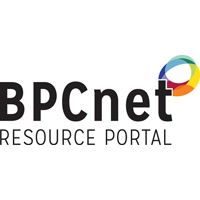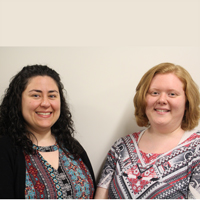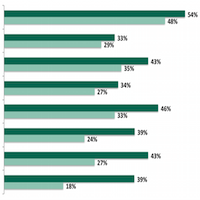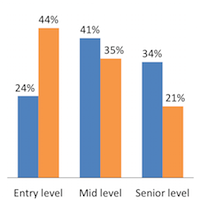
CRA Directors Erik Russell and Burçin Tamer featured on the Modern Figures Podcast
CRA Directors Erik Russell and Burçin Tamer share inspiring stories of CRA broadening computing efforts on the Modern Figures Podcast.

CRA Directors Erik Russell and Burçin Tamer share inspiring stories of CRA broadening computing efforts on the Modern Figures Podcast.

BPCnet.org will be hosting its last working session for this year on Thursday, November 18th, 2021, from 3:00 PM- 5:00 PM ET.

BPCnet.org has a new Statistics and Data Hub resource update that allows users to access publicly available computing-specific data.

CRA has recently hired Roohia Meer as a program assistant for the Center for Evaluating the Research Pipeline (CERP). She supports CERP’s efforts aimed at broadening participation in computing research and education.

The National Science Foundation (NSF) Directorate of Computer and Information Sciences and Engineering (CISE) announced an updated Core Programs solicitation (NSF 21-616) with new guidelines for submitting Project Broadening Participation in Computing (BPC) Plans.

CRA will be represented during the upcoming DOE Advanced Scientific Computing Advisory Committee (ASCAC) meeting. Attend CRA session “Taulbee, Talent, and Trends” from 1:00-1:45 PM ET on September 30, 2021.

The Data Buddies Project has been running strong since 2010. This article dives into some of the history of the Data Buddies Project and CERP while also highlighting the project over the years. The article concludes with a look into how the project operates today.

The CRA Center for Evaluating the Research Pipeline (CERP) will support one of the new INCLUDES Alliances as a consultant representing BPCnet.org, a clearinghouse for the community to learn about and engage with ongoing projects to address underrepresentation in Computing. Through this collaboration, CERP will work to expand the BPCnet.org Statistics and Data Hub, an online tool that currently provides computing-related data at the K-12 and postsecondary levels.

Consider registering for NSF’s Directorate for Computer and Information Science and Engineering (CISE) Research Experiences for Undergraduates (REU) program solicitation webinar on August 6th, 2021 starting at 12:00 pm ET.

The Computing Research Association (CRA) seeks a full-time employee to join our team as a Program Assistant working with the CRA Center for Evaluating the Research Pipeline (CERP). The following description outlines the general nature of this position and is not intended to be an exhaustive list of all responsibilities and skills necessary for this […]

Recently, CERP was contracted by the National Science Foundation (NSF) Directorate for Computer and Information Science and Engineering (CISE) to evaluate the CISE Research Experiences for Undergraduates (REU) Program, starting spring of 2022. For more information, visit https://cra.org/cra/cerp/cerp-reu-evaluation/

Using CRA Data Buddies Survey data, this analysis presents changes in undergraduate students’ highest degree intentions over the course of a year. Students who participated in an REU during that year showed an interest in pursuing a higher-level academic degree than those who did not participate in an REU.

On Monday, March 15, CRA’s Burçin Tamer was a panelist at the SIGCSE 2021 session, “How Student Surveys Drive Change: Using the Data Buddies Department Report from the Computing Research Association.” Tamer and panelists discussed how departments can use their students’ responses to the Data Buddies survey to make meaningful changes in their department.

The CRA Center for Evaluating the Research Pipeline (CERP) is excited to launch a new blog called the CERP Bulletin to share news, research and evaluation findings, promote resources and community platforms, and provide helpful context to CERP’s mission. The CERP Bulletin will include CERP research activity, infographics, evaluation reports, and interesting CERP-related articles.
We encourage you to stay updated on CERP through the Bulletin by signing up for our mailing list, which you can do here.
This post is brought to you by the CRA’s Center for Evaluating the Research Pipeline (CERP). CERP provides social science research and comparative evaluation for the computing community. Volunteer for Data Buddies by signing-up here.

Listen to NSF AD for CISE Margaret Martonosi discuss the importance of Departmental BPC Plans in this new video.

The Computing Research Association (CRA) and the National Science Foundation’s (NSF) Directorate for Computer and Information Science and Engineering (CISE) are calling upon the academic community to create and submit Departmental BPC Plans to BPCnet.org.
Departmental BPC Plans are important because they help departments:

The Computing Research Association (CRA) is hosting the third workshop in its series of Departmental BPC Plan workshops starting on October 29, 2020. All departments with faculty submitting CISE proposals are welcome to attend this workshop.
The structure for this workshop is as follows:
On the presentation day, academic departments will learn about the NSF CISE requirements and expectations for BPC Plans. The workshop will also cover in-depth discussions on BPC Plan components and have BPC experts available for Q&A.
The two writing days are optional, but strongly encouraged. For each writing day, attendees will dedicate a few hours to writing a BPC plan with available assistance from BPC experts. Of importance, you are not required to attend the presentation day if you would like to attend the writing days. For example, previous workshop participants could use these days to further develop their drafts.
Click here to sign up for the workshop. The deadline to sign up for the presentation day is 11:59 pm (ET), October 25, 2020. Those signing up for the writing days only will be accepted on a rolling basis. All notifications and action items related to the workshop will be sent in advance.

A recent Forbes article written by Maria Klawe, president of Harvey Mudd College and a former CRA board member, addresses “Why We Need Inclusive Teaching In Every Classroom.” In the article, Klawe interviews Colleen Lewis, a computer science professor at Harvey Mudd, about Lewis’ work to develop, incorporate, and disseminate inclusive teaching practices. Lewis researches […]

CRA’s Center for Evaluating the Research Pipeline (CERP) recently underwent staffing changes when former Director Jane Stout left the CRA. Burçin Tamer, Ph.D., is now the Director of CERP and Heather Wright is the Associate Director. Under their leadership, CERP will extend its reach as a resource for the computing community through its Data Buddies Project, evaluation services, and other activities. Heather and Burçin are both excited to make contributions to the computing community and drive the broader mission of CRA to facilitate the development of strong, diverse talent in the field.

After serving for more than five years as CERP director, Jane Stout has left CRA to pursue a senior project director position for YOUGOV. During Jane’s tenure at CRA, she oversaw the Data Buddies Project; led CERP in evaluation work for the CRA-W, CCC, and CRA-E; and obtained an NSF grant to conduct computing education research focusing on diversity. Jane also gave numerous talks and interviews on the importance of diversity in computing and shared CERP’s research findings with the computing community.
While she will be missed by her colleagues at CRA, CERP, and the CRA-W community, we wish all the best for her as she embarks on this next stage of her career.
CRA wishes to thank the computing departments who distributed CERP’s Data Buddies survey during the fall of 2017. These departments’ collective effort provided vital data for CERP’s research and evaluation assessing students’ varied experiences in computing degree programs.
Recently, CRA board member Kim Hazelwood (Facebook) and Natalie Enright Jerger (University of Toronto) published an article in Computer Architecture Today that analyzed gender diversity in the sub-discipline. CRA’s Jane Stout provides her commentary.

The CRA’s Center for Evaluating the Research Pipeline (CERP) turns four years old this month. During the past four years, CERP has been working steadily toward its goal of building diversity in computing through evaluation and social science research. CERP is staffed by Director Jane Stout, Research Scientist Burcin Tamer, and Research Associate Heather Wright. As seen on CERP’s About page, CERP staff are an eclectic mix of social scientists with expertise in quantitative and qualitative methods and a passion for diversity research.

Since May 2013, the CERP team has published a graphic in each issue of Computing Research News (CRN) that analyzes the experiences of underrepresented students and professionals in computing. Each month, this newsletter will share the infographic published in CRN and news about CERP. If you are interested in receiving this newsletter, subscribe here.

CERP recently extracted Web data to observe the career progression of women who had participated in the CRA-W’s 2008 or 2009 Career Mentoring Workshops (CMWs) compared to a sample of women who had never participated in CMWs. We obtained the comparison sample from a population of women who earned their Ph.D.s in computer science during the same time period as the participants. We collected current career information including job titles (e.g., associate professor) and job setting (e.g., academia vs. industry/labs) for both groups. We then categorized job titles as entry level (e.g., assistant professor, software engineer), mid level (e.g., associate professor, senior engineer), and senior level (e.g., professor, principal program manager), collapsed across job setting. To test for a systematic difference in job rankings between workshop participants and the comparison group, we ran a 2 (Group) x 3 (Job Title Rank) Chi-squared test and found a statistically significant difference in rankings across the two groups, χ2 (2, N = 181) = 8.46, p < 0.05. Specifically, CMW participants were less likely than non-participants to be in an entry level position, p < .05, and more likely to be in a senior level position than non-participants, p < .05.
A paper from CRA’s Center for Evaluating the Research Pipeline (CERP) was recently named an “Exemplary paper” in the 2017 SIGCSE Proceedings. New this year, the SIGCSE program chairs recognized a new category of the top 25% of accepted papers as “Exemplary papers”, highlighted for their accomplishment of high quality, novelty and broad appeal to […]
CRA wishes to thank the computing departments who distributed CERP’s Data Buddies survey during the fall of 2016! The collective effort of these departments provides data for CERP’s research on students’ experiences and successes in computing degree programs.

In CERP’s 2015 Data Buddies survey, computing majors were asked whether they had thought about changing to a non-computing major during the past year. Thirteen percent of students who responded to this question said that they had. The word clouds here were created using students’ comments about the reasons they considered leaving computing and factors that helped them stay. Some of the most frequently encountered words in students’ reasons for considering leaving computing were “classes”, “hard”, “difficult”, “work”, and “time”. On the other hand, students’ responses regarding the factors that helped them stay in computing contained words such as “job”, “degree”, and “friends”.
On Monday, November 14, CRA’s Center for Evaluating the Research Pipeline (CERP) distributed its annual Data Buddies surveys to more than 110 participating “buddy” computing departments.
Buddy departments send the survey to students affiliated with computing (e.g., majors; minors; students enrolled in CS courses; graduate students), and in return they receive a customized report on their students’ responses. The survey measures students’ experiences in computing (e.g., sense of belonging), aspirations for the future (e.g., intentions to pursue a Ph.D.), and participation in computing activities (e.g., formal research experiences).
CERP uses data buddies data to conduct evaluation as well as social science research on diversity issues in computing.
Is your department a buddy? If not, help the computing community by volunteering your department to become a Data Buddy today! Visit CERP’s website to learn more, view our list of buddies, and sign up: http:/cra.org/cra/cerp/data-buddies/.
By Shar Steed, CRA Communications Specialist Similar to how we are currently facing a boom in undergraduate computer science enrollments, several years ago, the field encountered an exponential increase in postdoctoral appointments. In a Communications of the ACM Viewpoint article from February 2013, The Explosive Growth of Postdocs in Computer Science, Anita Jones wrote, “The […]
